At the Iranian National Day reception
“We were informed that President Park Geun-hye has been planning her visit to Iran in the near future, which is going to be the first-ever such a state visit in the long record of relations between the two countries,” said Ambassador Hassan Taherian of Iran in Seoul at the National Day reception he hosted at Lotte Hotel in Seoul on Feb. 16, 2016. Then he said that the Presidential visit will surely open a new chapter in the bilateral relations and will provide ample opportunities for better understanding between two countries and have a positive impact on Iran-Korea cooperation as well (excerpts from the speech toward the end of this article).
The luncheon reception to celebrate the 37th anniversary of the Islamic Revolution was attended by an estimated 700 Korean and international guests as well as most of the ambassadors in Seoul, which, in the case of the Korean guests, was nearly double the number guests at previous such functions.
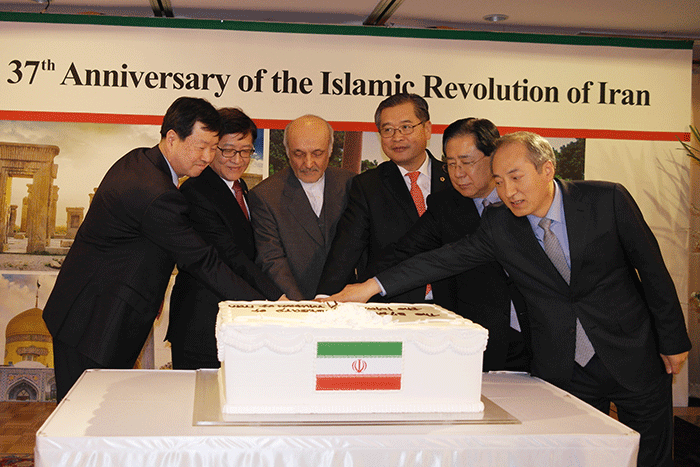
Why the sudden increase of interest in Iran in Korea?
Korea used to enjoy the so-called ‘Middle East Boom’ through the construction companies and trading firms and Iran was one of the prominent countries in the Middle East where the Korean companies actively took part in the economic development in the region.
The unusually large attendance of the Korean and international guests at the party is also partly due to the personal popularity of Ambassador Taherian who has a long and close connection with Korea. Also he is accredited to North Korea as Iranian ambassador and is in a good position to help improve the inter-Korean relations.
Attending the reception were many prominent Korean government and business leaders. Among them were Minister Chung Chin-youb of Health and Welfare, President Sung Nak-in of Seoul National Univeristy, Chairman Lee Hae-dong of the Busan Metropolitan Council, Directors-General Park Young-sik of the Ministry of Health & Welfare and Lee Sang-jin of the Ministry of Trade Industry & Energy, Director Kim Jae-jeong of the Ministry of Land, Infrastructure & Transportation, and leaders of many leading Korean business companies (see list at the end of this article).
From the Seoul Diplomatic Corps came many ambassadors with their spouses (see list at the end of this article).
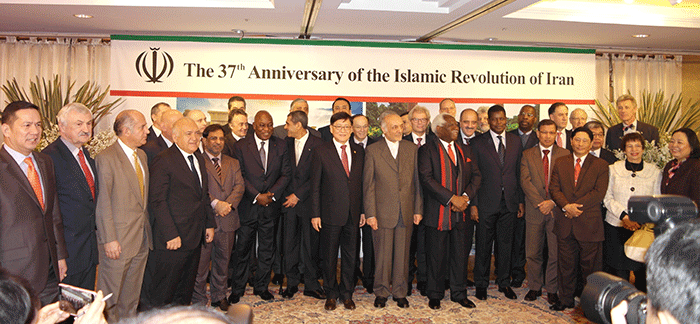
Excerpts from the speech of Ambassador Taherian of Iran:
I am honored to welcome you at the celebration of the National Day of the Islamic Republic of Iran.
We meet today to commemorate the 37th anniversary of the Islamic Revolution of Iran that falls on 11th of February.
37 years ago, the people of my country in a series of massive demonstrations and popular political movements under the wise leadership of Imam Khomeini overthrew the dictatorial regime of Pahlavi and elected and established the new system of the Islamic Republic which is based on modern Iranian-Islamic civilization and religious democracy.
Significantly this year, the anniversary of the victory of our Islamic Revolution has coincided with another victory for the Iranian nation and government in the international scene. This new achievement is the success of our government to manage and conclude one of the most complicated diplomatic crisis of this decade which was the Iran nuclear program dossier. Iran succeeded to reach a historical nuclear accord with six world power, turning the Iran nuclear program from an unnecessary crisis into a platform for cooperation. By putting some limitations on its nuclear activities and accepting the highest level of transparency and inspection on its nuclear program, Iran once again demonstrated clearly that never ever intended to build atomic bomb.
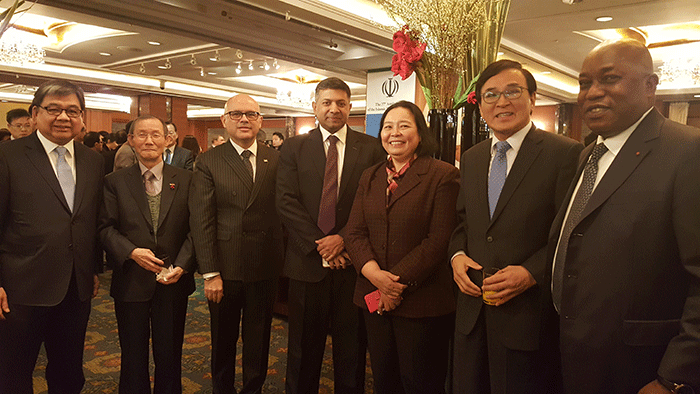
The negotiation settlement to the Iran nuclear program is a Victory for diplomacy and helped to remove the shadows of war and pseudo threats from our region. Most importantly, this settlement provides the opportunity for the region to focus its attention on current real and dangerous threat which is terrorism and violent extremism, which threatens everybody.
By the relocation of the economic sanction, the amount of interest in Iran has been unbelievable. We have hosted more than 50 foreign trade delegations to Iran during the last two or three months.
Located in the central part of Eurasia, Iran, blessed with rich civilization and culture, has long enjoying of geostrategic importance because of its central location in Eurasia and Western Asia and its proximity to the Strait of Hormoz. Iran with a diversified economy and broad industrial base, huge natural resource, young and educated population, large domestic market, access to the regional market and increasingly sophisticated infrastructure providing the foundation for an emerging economy which offers endless investment opportunities to local and international investors.
Iran and Korea established the diplomatic relations in 1962. Throughout these years, the two countries maintained a relatively friendly and strong relationship. The presence of the Tehran Street in Gangnam district of Seoul as well as the Seoul Street in North of Tehran, are the symbol and remainder of long friendship between the two countries.
We have had a number of official meetings recently, among them, the last year visit of the South Korean Minister of Foreign Affaires, as well as the Minister of Land, Infrastructure and Transport to Tehran. Fortunately, we were informed that Her Excellency, President Park, Geun-Hye, has been planning her visit to Iran in near future. This is going to be the first ever such a state visit in the long record of relations between the two countries. Surely, the upcoming presidential visit will open a new chapter in the bilateral relation and will provide ample opportunities for better understanding between officials and will have a positive impact on Iran-Korea cooperation, as well.
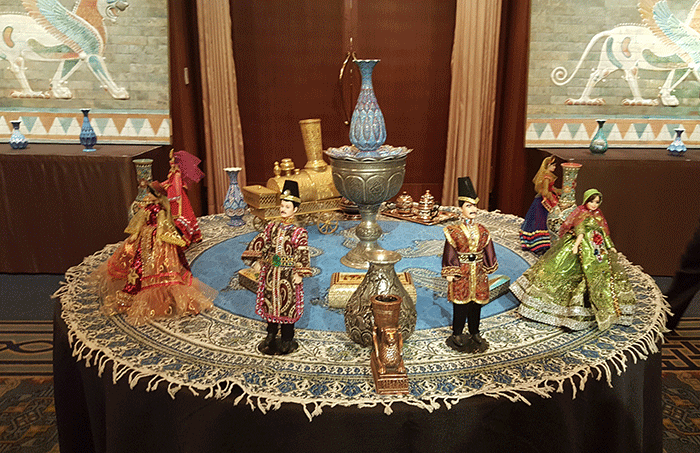
As far as the trade relation between the two countries is concerned, we always value and support particularly business relations between our two countries. Korean companies have a long record of involvement and successful activity in Iranian market and working in many infrastructure and construction projects in Iran. They enjoy a very good reputation as the reliable and confident partner and this is a valuable asset for their future activity in the Iranian market.
By the end of this month, on February 29, the Korea-Iran Joint Economic Commission is scheduled to be held in Tehran. Simultaneously and alongside with this Commission, there is going to be a Business Forum by the participation of huge number of businessmen from the private sector of both countries.
I believe the lifting of the sanctions, provides a plenty of opportunities for Korean firms to resume or increase their activities in the Iranian market.
We welcome and will encourage the Korean companies to boost their business in Iran.
In closing, I would like to express my sincere appreciation to all of you for your attendance in our reception and hope you enjoy your time with us today.
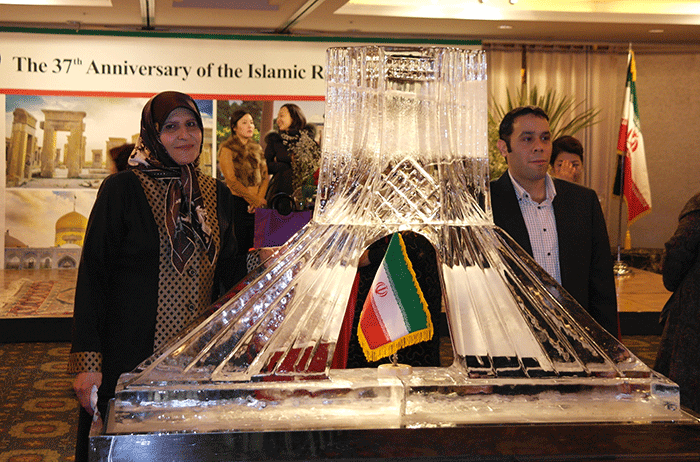
Partial list of ambassadors attending the reception:
Ambassadors Mohammad Saleem Sayeb of Afghanistan, Derragui Mohammed Elamine of Algeria, Albino Malungo of Angola, Elisabeth Bertagnoli of Austria, Ramzi Teymurov of Azerbaijan, Md. Zulfiqur Rahman of Bangladesh, Natallia Jhylevich of Belarus, Guadalupe Palomeque de Taboada of Bolivia, Dato Paduka Haji Modh Rosli Bin Haji Sabtu of Brunei Darussalam , Petar Andonov of Bulgaria, Tito Saul Pinilla Pinilla of Colombia, Rodolfo Solanco Quiros of Costa Rica, Sylvestre Kouassi Bile of Cote d'Ivoire, Grecia Fiodalicia Pichardo of Dominican Republic, Oscar Gustavo Herrera Gilbert of Ecuador, Milton Alcides Magana Herrera of El Salvador , Gerhard SABATHIL of Delegation of The Europan Union, Matti Heimonen of Finland, Carlos Victor Boungou of Gabon, Rolf Mafael of Germany, Nikoloz Apkhazava of Georgia, Gabor Csaba of Hungary, Vikram Kumar Doraiswami of India, Bessho Koro of Japan, Omar Al Nahar of Jordan, Mohammed Chraibi of Morocco, Dato Rohana binti Ramli of Malaysia, Mohamed Salim Alharthy of Oman, Zahid Nasrulah Khan of Pakistan, Irineo Raul Silvero Silvagni of Paraguay, Raul S. Hernandez of the Philippines, Krzysztof Majka of Poland, Calin Fabian of Romania, Alexander Andreevich Tomonin of Russia, Mamadou Ndiaye of Senegal, Zoran Kazazovic of Serbia, Milan Lajciak of Slovak Republic, Nozuko Gloria Bam of South Africa, Gonzalo Ortiz Diaz-Tortosa of Spain, Niroshani Manisha Dias Abeywickrema Gunasekera of Sri Lanka, Joerg Alois Reding of Switzerland, Kiromov Salohiddin of Tajikistan (CDA), Mohamed Ali Nafti of Tunisia, Hakan Okcal of Turkey, Andrea Veronica Bais Gastaldi (CDA) of Uruguay, Botirjon Asadov of Uzbekistan, Ms. Yadira Hidalgo de Ortiz of Venezuela (CDA), Mumba Smyth Kapumpa of Zambia
Partial list of Korean guests attending the reception:
Chairman & CEO B.S. Park of Korea Registry of Shipping, President & CEO Kim Jung-rae of Korea National Oil Corp., General Manager Son Jin-seck of Daewoo Shipping & Marine Engineering, President Sohn Myong-sei of Health Insurance Review & Assessment Service, Chairman Cho Hae-hyeong of Nara Holdings Corp., Head of Team Lim Tae-hoon of Ministry of Oceans and Fisheries, Vice President Heo, Sun-haeng of GS E&C, President & Chief Executive / Civil & Infra Lee, Sahng-ki of GS E&C / Seoul, President Kim, Kwang-min of Union Flow Control System Group, Director Kim, Jae jeong of Ministry of Land, Infrastructure and Transportation, CEO Jeon, Sang-heon of Chungbuk Free Economic Zone Authority, Chairman & CEO Shin, Jae Hyun of West Aisa Economic Forum, Vice President Kim, Young ho of KCC, President Lee, Young chan of Korea Health Industry Development Institute, President Sung, Nak-in of Seoul National Univeristy, CEO Park, No hwang of The Yonhap News Agency, Director Joon Lee of LOTTE Engineering & Construction, Director General Hwang, Hyeon-gyu of KHIDI, CEO Kim, Jae-sik of Hyundai Development Co., Director Lee Kap-soo of Korea Times, President Lee Jin-sook of MBC, Daejeon, President & CEO Kim, Jae-sik of Hyundai Development Company, President Choi, Du-youlof FTE(Fluid Thermal Engineering), Vice President Lee, Soo-yeon of DAELIM, Executive Vice President Yun, Won-sok of KOTRA, Director General Park, Young-sik of Ministry of Health & Welfare, Chairman Lee, Hae-dong of BUSAN METROPOLITAN COUNCIL, Director General Lee Sang-jin of Ministry of Trade Industry & Energy
--------------------------------------------------------------------------------
Many countries lock horns to woo sanction-lifted country
Korea should try to show how she can do best for Iran
By Lee Kyung-sik
Publisher of The Korea Post
Following the lifting of sanctions against Iran, many countries of the world are seen locking horns with one another to be the first to enter the country for economic cooperation.
The first and obviously the most active country seems to be France who invited President Hassan Rouhani to visit France on Jan. 28, 2016. Korean-language media reports indicate that the leaders of Iran and France signed contracts totaling some 30 billion Euro (about 40 trillion Korean Won), including the purchase of 118 Airbuses.
According to an article by former President Joohum Lee of the Korea National Diplomatic Academy (KNDA) published by MaeilKyungje on Feb. 15, 2016, President Rouhani of Iran has also visited Italy, in advance of his French contacts, and singed contracts totaling some 16 billion Euro (22 trillion Korean Won). According to Lee, Iran has special relations with France and Italy.
In 1997, Italy invited former President Mohammed Khatami of Iran to visit Italy and has thenceforth been pursuing a pro-Iran policy.
France provided political asylum to the late former Supreme Leader Ayatollah Khomeiny of Iran in 1979, and has been maintaining close ties of friendship and cooperation between the two countries.
Approaching Iran for increased cooperation are not limited to France and Italy. Germany, the United States and China are also making extensive efforts to join the ‘Iran rush.’ Among the three stands out China. President Xi Jinping of China wants to rebuild a ‘New Silk Road’ to connect the Arab world and Europe through Iran.
As soon as the international sanction was lifted on Iran, President Xi visited Iran before any other head of state. Xi did not ask for money but traded automobiles, missile parts and textile goods for Iranian oil. The arrangement helped China make a big jump to the status of Iran’s biggest trade partner.
In contrast, the United Kingdom, who had monopolized the Iranian oil market until the 1950s, has become a target of total disregard. Reports say that the UK failed to change the negative image of its old ‘oil majors’ in the new surroundings.
So what should Korea do in this situation?
Former President Lee of KNDA suggests that Korea should try not to lose time. Korea should realize that she is neither a very close country to Iran nor one who is so far away. Korea should try to come up with attractive offers for Iran compared those of the competitors. For this purpose, Korea needs a systemized vision. Korea should come up with a concerted plan of cooperation with all the competent business companies to show Iran an attractive picture that other countries can’t.

